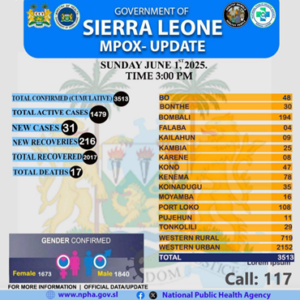The Ministry of Health in Sierra Leone has reported a concerning increase in mpox cases, with 31 new confirmed infections as of 3:00 PM on Sunday, June 1, 2025. This latest surge brings the cumulative total of confirmed mpox cases nationwide to 3,513, underscoring the ongoing challenge the West African nation faces in controlling the outbreak. The government, through the National Public Health Agency (NPHA), continues to actively monitor and respond to the evolving situation, urging public vigilance and adherence to health guidelines.
Despite the rise in new infections, there’s also positive news on the recovery front, with 216 individuals newly recuperating from the virus. This brings the total number of recovered cases to a significant 2,017, demonstrating the effectiveness of ongoing medical interventions and care. Currently, Sierra Leone has 1,479 active mpox cases, with the total number of fatalities remaining at 17. Authorities had previously sought international assistance to curb the outbreak, with Deputy Health Minister, Charles Senessie, stating on May 31, 2025, that the country appreciates its development partners and would continue to seek their assistance for necessary resources.
A geographical analysis of confirmed cases reveals that Western Urban remains the epicentre of the outbreak, accounting for 2,152 cases. Western Rural follows with 719 cases, and Port Loko with 108. Other districts reporting notable case numbers include Bombali (194), Kenema (78), Kono (47), and Bo (48). The data also highlights a gender disparity, with more males affected (1,840 confirmed cases) compared to females (1,673). The National Public Health Agency (NPHA) is the official source for data and updates, encouraging the public to visit their website at www.npha.gov.sl or call the hotline at 117 for further information and guidance.

Mpox, caused by a virus from the same family as smallpox, typically presents with a rash, fever, headache, muscle aches, and swollen lymph nodes. While most cases are mild and resolve within a few weeks, severe cases can occur. Transmission primarily occurs through close contact with an infected person, their bodily fluids, lesions, respiratory droplets, or contaminated materials. Sierra Leone has been grappling with the Clade 2 strain of the virus, generally considered less severe than Clade 1, though officials have noted an unprecedented level of severity in genital lesions among patients. Vaccination efforts are underway, with 20,000 vaccine doses expected to arrive soon, primarily for high-risk contacts, including healthcare workers. Over 42,000 healthcare workers have already been vaccinated. The government and NPHA continue to emphasize the importance of hygiene, avoiding close contact with infected individuals, and seeking immediate medical attention if symptoms appear.